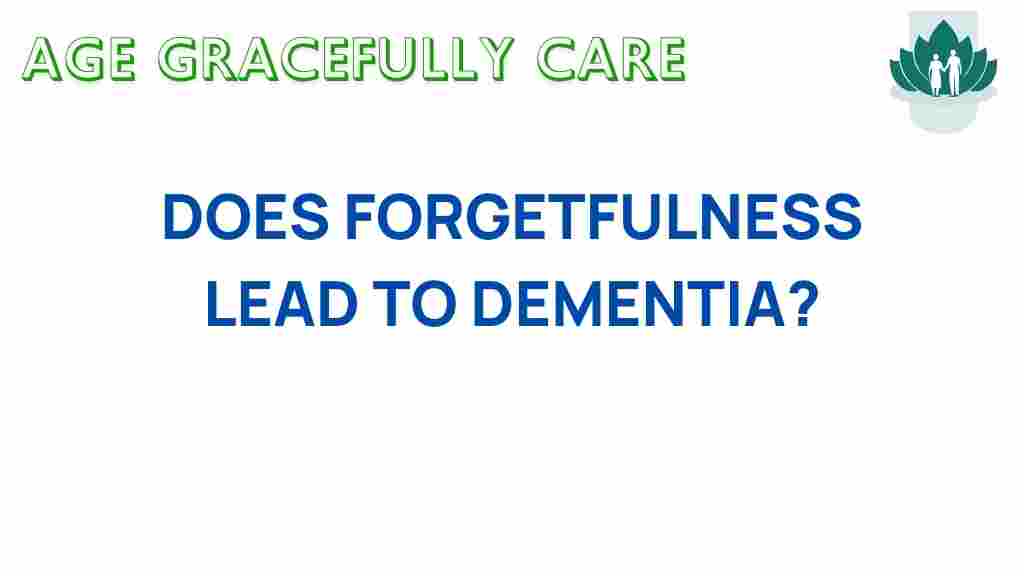Unraveling the Mystery: Does Forgetfulness Signal Dementia?
Forgetfulness is a common experience many people encounter as they age. However, when does forgetfulness become a cause for concern? The relationship between forgetfulness and dementia is complex, often leaving individuals and their families wondering if memory loss is a sign of cognitive decline or simply a normal part of aging. In this article, we will explore the nuances of forgetfulness, its connection to dementia, the early signs to watch for, and how to maintain brain health as we age.
Understanding Forgetfulness
Forgetfulness can manifest in various ways, ranging from misplacing items to having difficulty recalling names or recent events. It’s important to differentiate between occasional forgetfulness and more serious forms of memory loss that may indicate cognitive decline. Here are some common types of forgetfulness:
- Short-term memory loss: Difficulty remembering recent events or information.
- Long-term memory loss: Trouble recalling past experiences or information.
- Prospective memory loss: Forgetting to carry out planned actions, like appointments or tasks.
As we age, it’s normal to experience some of these forms of forgetfulness. However, when they begin to interfere with daily life, it may be a sign of something more serious.
The Connection Between Forgetfulness and Dementia
Dementia is an umbrella term that describes a range of symptoms affecting memory, thinking, and social abilities severely enough to interfere with daily life. Alzheimer’s disease is the most common cause of dementia, accounting for 60-80% of cases. Understanding the early signs of dementia is crucial for timely intervention and care.
Here are some key points to consider regarding forgetfulness and dementia:
- **Normal Aging vs. Dementia**: Aging can lead to forgetfulness, but dementia involves persistent and progressive memory loss.
- **Types of Memory Loss**: People with dementia often struggle with both short-term and long-term memory, whereas age-related forgetfulness typically affects short-term memory.
- **Associated Symptoms**: Dementia is often accompanied by other cognitive issues, such as confusion, difficulty with language, and impaired judgment.
Early Signs of Dementia
Recognizing the early signs of dementia can be challenging. Here are some symptoms to watch for:
- **Increased forgetfulness**: Frequent memory lapses, especially regarding recent events.
- **Difficulty with familiar tasks**: Struggling to complete everyday tasks, such as cooking a meal or managing finances.
- **Language problems**: Trouble finding words or following conversations.
- **Disorientation**: Getting lost in familiar places or forgetting the date and time.
- **Changes in mood or behavior**: Increased anxiety, depression, or withdrawal from social activities.
If you or a loved one is experiencing these symptoms, it’s important to consult with a healthcare professional for a comprehensive evaluation.
Maintaining Brain Health as You Age
While forgetfulness can be concerning, there are proactive steps you can take to maintain brain health and reduce the risk of cognitive decline:
- Stay Mentally Active: Engage in activities that stimulate your brain, such as puzzles, reading, or learning new skills.
- Physical Exercise: Regular physical activity promotes blood flow to the brain and can help improve memory and cognitive function.
- Healthy Diet: A balanced diet rich in fruits, vegetables, whole grains, and healthy fats supports brain health.
- Social Engagement: Stay socially active by connecting with friends and family, which can help keep your mind sharp.
- Sufficient Sleep: Prioritize a good night’s sleep, as poor sleep can negatively affect memory and cognitive function.
Step-by-Step Process to Address Forgetfulness
If you or someone you know is experiencing forgetfulness, here is a step-by-step process to address the issue:
- Document Symptoms: Keep a record of specific instances of forgetfulness and other cognitive changes.
- Assess Lifestyle Factors: Evaluate diet, physical activity, sleep patterns, and social interactions.
- Consult a Healthcare Professional: Schedule an appointment for a comprehensive assessment. Bring your documentation to help the doctor understand the situation better.
- Follow Recommendations: Based on the assessment, follow any recommendations or treatment plans provided by the healthcare provider.
- Monitor Changes: Continue to track memory changes and overall cognitive health over time.
Troubleshooting Tips for Managing Forgetfulness
Here are some practical tips to help manage forgetfulness in daily life:
- **Use Reminders**: Utilize technology, such as smartphone apps or digital assistants, to set reminders for important tasks.
- **Create Routines**: Establish daily routines to help you remember tasks and appointments more easily.
- **Organize Your Environment**: Keep essential items in designated places to reduce the likelihood of misplacing them.
- **Practice Mindfulness**: Engage in mindfulness exercises to improve focus and memory retention.
- **Stay Informed**: Educate yourself about brain health and cognitive decline through reputable sources. For more information, visit Alzheimer’s Association.
Seeking Support for Mental Health
Forgetfulness and cognitive decline can take a toll on mental health. It’s vital to seek support if you or a loved one is struggling. Here are some resources:
- **Therapy and Counseling**: Professional support can help manage anxiety or depression related to cognitive issues.
- **Support Groups**: Joining a support group for individuals facing similar challenges can provide emotional support and practical advice.
- **Family Support**: Encourage open dialogue about memory issues with family members to foster understanding and support.
Conclusion
In conclusion, while forgetfulness is a normal part of aging, it can also signal more serious issues like dementia. Understanding the differences between age-related memory lapses and early signs of cognitive decline is crucial. By staying informed, maintaining brain health, and seeking professional guidance when needed, individuals can navigate the complexities of forgetfulness and dementia more effectively. Remember, early intervention can make a significant difference in the management of brain health. If you’re concerned about memory loss, don’t hesitate to reach out to a healthcare provider for support and guidance. Together, we can unravel the mysteries of forgetfulness and ensure a healthier future.
This article is in the category Health and created by AgeGracefullyCare Team
